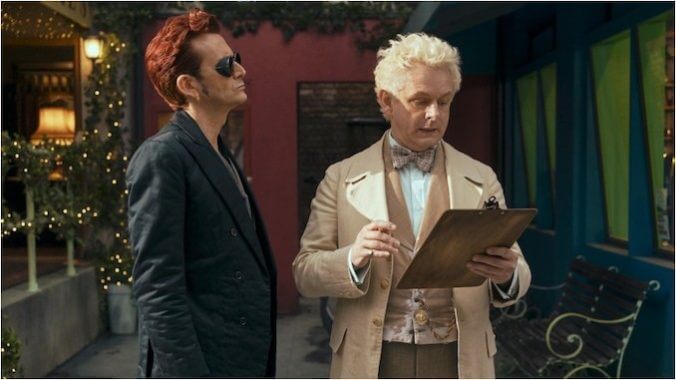The Good Omens Season 2 Finale Is a Test of Faith
Photo Courtesy of Prime Video
Being a television critic can be rough sometimes. Often, we’re asked to pass judgment on things we haven’t seen in their entirety, that are unfinished or otherwise in a state of flux. Usually, it works out, universal themes and arcs being what they are. But every so often, there’s a show like Good Omens, whose second season finale wasn’t screened for critics and is such a gut punch it makes you kind of want to reevaluate every word you have ever written about the medium.
Did I get this wrong? (You ask yourself.) What is happening? (You wail.) How is this possible? (You shout into a pillow)

This is a lot to say that after five episodes of gentle, heartwarming, and downright romantic fluff, the angst hammer lands hard in the Good Omens Season 2 finale, an episode in which prim angel Aziraphale (Michael Sheen) accidentally starts a war with Hell, the Metraton (Derek Jacobi) offers him Gabriel’s (Jon Hamm) job, and Crowley (David Tennant) refuses an offer to return to the Heaven he was cast out of so long ago. The hour, most devastatingly, also sees our favorite co-dependent eternal life partners go their separate ways in the episode’s final moments. Aziraphale chooses to return to Heaven, and Crowley drives off in his Bentley alone. “Our side” is apparently no more and a desperate, long-awaited kiss turns into a painful farewell. The sense of perfect possibility that closed Season 1 is almost entirely absent, and basically everyone ends up in tears.
Did this show just break my heart? (You wonder, staring into the void.)
Yes and no. Perhaps it’s the fact that this show has such an overtly religious premise that makes me want to analyze it in a framework that includes a metric ton of Bible quotes, but I’m in it now, so here goes. Before anyone—including me—loses their mind over the fact that the season concludes on what is undoubtedly a heartbreaking note: Be not afraid. My review of the first five episodes ended with that admonishment, and now having seen the finale, I still feel that way. Despite, and perhaps even more so because of, everything that’s in it.
After all, Neil Gaiman wrote this, the same man who has spent the better part of the last thirty years repeatedly telling all and sundry that Good Omens is, above all things, a love story. A love story of many themes and parts, to be sure, but even if I weren’t a person of faith, I would have a hard time believing that God as Gaiman and his writing partner Terry Pratchett once envisioned Her signed off on an ending where the story’s main characters end up miserable and alone. It’d be a pretty crappy ineffable plan, not to mention it would also break every rule of romantic storytelling to boot. (And this is a show that loves its rom-com tropes.)
-

-

-

-

-

-

-

-

-

-

-

-

-

-

-

-

-

-

-

-

-

-

-

-

-

-

-

-

-

-

-

-

-

-

-

-

-

-

-

-








































